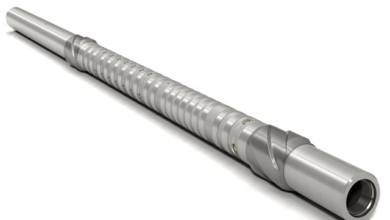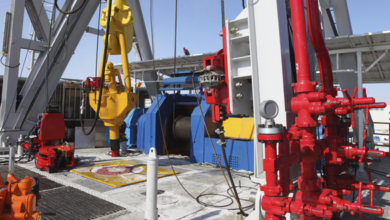Pushing for innovations in a risk-averse industry
Perspectives: J. David Payne, Chevron vice president – drilling and completions
by Linda Hsieh, assistant managing editor
For many petroleum engineers who end up building their careers on the drilling side of the business, one common theme often appears: Production is boring.
It is no different for David Payne, vice president – drilling & completions for Chevron, who spent approximately 18 months working as a production engineer for Getty Oil Company after getting his petroleum and natural gas engineering degree from Pennsylvania State University in 1981. “Production work bored me to tears,” he recalled.
 David Payne, Chevron, visits the ultra-deepwater drillship Discoverer Clear Leader as it gets ready to begin operations in the Gulf of Mexico. The rig commenced its five-year contract with Chevron in August.
David Payne, Chevron, visits the ultra-deepwater drillship Discoverer Clear Leader as it gets ready to begin operations in the Gulf of Mexico. The rig commenced its five-year contract with Chevron in August.
Maybe a part of it was that he had gotten to spend time on drilling rigs during a summer internship for Getty the year before, and knew there was a whole different world on the drilling side. “It just seemed like there was something new every day (on drilling rigs). Something’s always happening. … I like the go-go attitude, and I’m always looking for newer and better ways to do things,” he said.
He finally got the chance to switch gears from production to drilling when a drilling engineering position opened up in Santa Maria, Calif. And when Texaco acquired Getty, he moved offshore California. After six months filling the night shift, Mr Payne finally got to supervise his own rig on Platform Harvest. “Then it got really fun,” he said.
He described his biggest challenge at the time as “trying to get people to think beyond what they’ve done and do something different. We have an innovative group of people in this industry, then there’s this big core that’s very traditional. Getting those traditional folks to see that maybe there’s a better way to do things was a big challenge.”
Mr Payne left Texaco in 1988, opting to work for a small independent oil company that, unfortunately, ran out of funding in less than a year. Still, he noted that it was a worthy experience because it gave him a taste of a different side of the business – in fact, an entirely different way to run the business. “Basically I was the drilling department. I was the drilling department, the procurement department, the permit department. I’d design the wells, and then go sit the rigs when we were drilling them,” he said.
After nearly a year working as an independent drilling consultant for various oil companies, Mr Payne was recruited into Unocal in 1990 as a drilling engineer. He immediately began pushing the envelope with ambitious drilling programs, wanting to drill horizontal wells that people weren’t sure they could drill. “I said, ‘Let’s see what we can do,’” he recalled.
He eventually became involved in five of the first cased-hole multilateral horizontal wells in the world, offshore California. One milestone achieved was the development of a hydraulic top drive system for small rigs. “I knew we had to rotate pipe to get to bottom to drill the wells we wanted to drill… we started digging around and built this little top drive out of a power swivel we found in south Louisiana,” he said. Another milestone came when his project used several of the world’s first retrievable whipstocks, which Mr Payne called great successes. “We set them at a very high angles and got every one of them back out of the ground.”
Overseas, Mr Payne has spent time in Trinidad, Indonesia, Vietnam and Thailand. He remembers arriving in Indonesia and working with the local team to push for new and better ways to drill. “We got in there and drilled the first horizontal wells in East Kalimantan. Everybody said we couldn’t do it, that we couldn’t stay in the sand.” But they did, and it brought about a mini-boom in horizontal drilling there. He also assisted in the development of monobore completions and surface BOP stacks that resulted in significant cost reductions in operations there.
Chevron acquired Unocal in 2005, and Mr Payne was promoted to his current position in May 2006. Now, more than anything else, he spends his time on people. “It’s about setting a tone for how we want to run our business, and making sure we have the right people with the right skill sets and the right attitude. And it’s the right thing to do. If I spend my time on equipment and technology, I will do the enterprise a disservice. I need to make sure we have the right people to do those things.”
For Chevron’s service partners, Mr Payne urges them to understand his company’s business and drivers: “Too often we have solutions brought to us for problems we may or may not have.” They also must focus on the long term, especially in this economic climate. “Believe it or not, the money’s made in the downturns. It’s what you do in the down cycles and how you prepare yourself for the next upturn that differentiates a company,” he said.




Mr. Payne, after reading about you, I felt you are the person to ask to please develop a better method of horizontal drilling (fracking method) to prevent drilling fluids and other contaminates seeping into ground water. America needs onshore drilling to get off foreign oil and has enough gas to move America, but with the recent gulf spill, many people oppose drilling because of pollution and ground water contamination is the next big fight between environmentalist and oil/gas drilling. This is an industry that needs innovation, please help our country get off foreign oil and keep our drinking water clean.